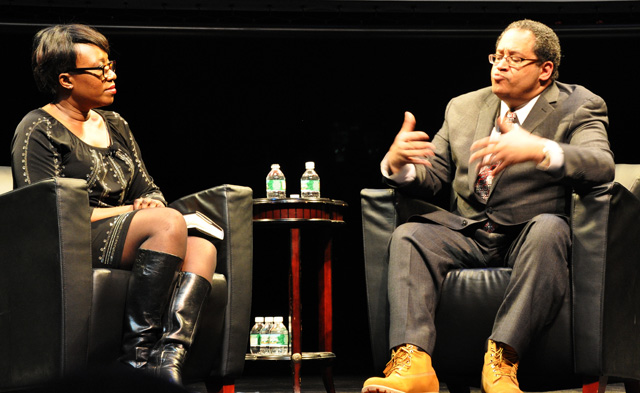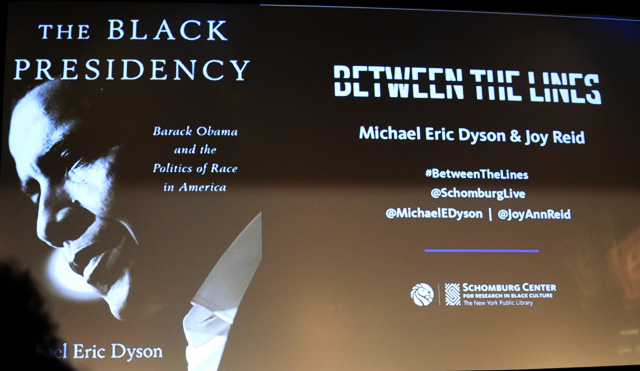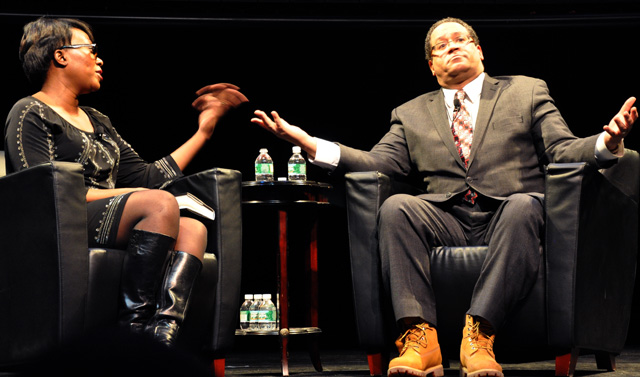
By Jessica Sutherland
“Been there, done Black!”
That’s the mentality of Americans as its first black presidency draws to an end, according to author and professor Michael Eric Dyson.
In an event at the Schomburg Center for Research in Black Culture, Dyson described what he sees as an American obsession with moving beyond race. Many Americans, he said, think that electing a black president confirms that the U.S. is a post-racial country.
Dyson believes post race (which he also referred to as post black), demands black people stop talking about racism and be satisfied that a black president was allowed into the White House. Moving forward, he said, Obama will be seen as the “token and the gesture” of having overcome race and the fight for equality.
Dyson joined MSNBC correspondent Joy Reid in the event to discuss his latest book titled The Black Presidency: Barack Obama and the Politics of Race in America. The auditorium was filled to capacity with over 300 enthusiastic audience members, most people of color.
Race continues to be a prevalent subject under the Obama administration, he said, with the murders of Tamir Rice, Trayvon Martin, Michael Brown, Eric Garner, Freddie Gray, and Walter Scott that sparked national protests.
Obama’s response to these events is instructive, said Dyson. Obama attempted to avoid race at first, and his procrastination, although unintentional, ended up hurting the nation, he said. Obama faced resistance from white America, said Dyson, but also had a “self imposed gag order” on discussing race because of the negative affect it had on his ratings whenever he did.

The fact that black unemployment reached the highest it’s ever been under Obama proves that the U.S. needs more than a token black president to end the issue of racism, he said.
Dyson’s animation and charisma kept the Schomburg Center crowd engaged. The audience response was similar to that of a church congregation to a dynamic preacher. They were very lively — raving as though Dyson was reading the gospel.
Dyson said the president himself was also a victim of racism, when people attempted to delegitimize his presidency with vicious stereotypes. The animalization of Barack Obama, Dyson said, is a reminder of how blacks have always been seen and addressed in America. And if they’re doing this to the president, he added, what are they doing to the ordinary black person on the street?

The “Problem with Obama” according to Dyson is that he didn’t make the connection right away, and he started “playing to the galleries of whiteness” to prove that he can hold black people in check– doing what was done to him to them. He began lecturing blacks in a condescending way, said Dyson, pointing out their errors and pathologies while ignoring the collective white psyche that ignores its own failure and flaws.
This isn’t meant to be a jab at Obama exclusively, said Dyson, who called the act a “temptation and a seduction” of people at the top, adding that even immigrants learn to demonize black people as a way of assimilating into American identity.
Dyson believes Obama will go down in history as one of America’s greatest presidents, but race won’t win him those plaudits. The Tea Party spins a narrative of Obama being the anti-American, even though he accommodated them more than any other president ever did, said Dyson.
The audience was energized, from beginning to end and the discussion went into overtime.
His advice to Obama in his last few months is to “get free,” encourage Black Lives Matter, strengthen public policies, be open and tell the truth with the time remaining so that people can honestly and thoroughly prepare for the next president. And his very last piece of advice, paint the White House black!



